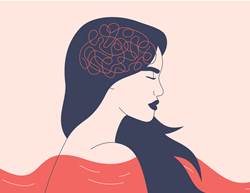Many chronic health conditions can be difficult—or even impossible—to recognise just by looking at a person or checking for one specific symptom. Depression, for example, does not only present as extreme sadness. There is a wide range of subtle depression symptoms that affect both the mind and body.
“Depression doesn’t always look like debilitating sadness,” says professor of internal medicine Dr Richard Kravitz and an expert in identifying depression in primary-care settings. “Patients are reluctant to consider depression as a cause of their symptoms—in part because they may equate it with weakness, but also because they simply don’t associate those symptoms with depression.”
Recognising the other possible symptoms, though, may be the difference between ongoing suffering and getting the treatment you need. Here are some of the surprising signs of depression worth noting.
1. Chronic pain
Depression and pain share some of the same biological pathways and neurotransmitters. According to a 2024 study in the journal Pain, 56% of people with depression or anxiety also experience chronic pain, compared to just 17% of those without depression or anxiety. “When you’re in a negative state, you’re apt to tune into your body more carefully and therefore feel any discomforts more acutely,” Dr Kravitz explains. You may also notice stomach aches and headaches or simply experience greater sensitivity to pain in general.
2. Weight gain
Multiple studies have confirmed a link between depression and obesity, with researchers noting that having depression makes weight gain more likely and being overweight or obese also increases the chances of developing depression.
On the flip side, some people with depression may lose weight, as depression often zaps appetite.
3. Rage or anger
If the slightest mishap sends you into a rage, or being grouchy feels like your new normal, depression may be a factor. It’s not uncommon for these emotions to show up together. “Once you’re on the negative side of the house, you’re more accessible to the rooms where other negative moods hang out—irritability, frustration and anger,” says psychologist Dr Simon Rego. “You’re not directly there, but it’s a short walk.”
4. Feeling like a zombie
Feeling flat, neutral or numb can also point to depression. “Most of us have motivations that get us out of bed in the morning, whether it’s work, exercise, socialising or making breakfast,” says Dr Rego. “But for people who are depressed, those pulls dry up.” At the same time, things that once sparked tears or smiles may barely register. This kind of zombie-like state is a hallmark of depression, and it can make someone appear cold, distant or aloof, pushing away the very people who might otherwise provide love and support.
5. Drinking more alcohol
People with depression often turn to alcohol or other substances in an attempt to self-medicate. And while one drink may take the edge off, a second or third can worsen negative emotions such as irritability, aggressiveness, anxiety and low mood. The healthy drinking limits, per the Australian Department of Health, are no more than 10 standard drinks a week and no more than 4 on any one day.
6. Being on social media 24/7
Or gambling, shopping or any other activity in excess—especially online. A review published in Psychiatry Research noted that people with depression are at higher risk of developing internet addiction, and the reverse is also true. This includes spending unusually long hours scrolling social media, gaming or online shopping. Why? Some may feel deprived of real human connection, while others use the online world to escape difficult thoughts and feelings. Although internet addiction and depression are separate conditions, they frequently overlap. “The quest for a short-term boost is a common coping mechanism,” says Dr Rego.
7. Difficulty making decisions
We make countless small decisions each day—hit snooze or get up, eggs or oats, telly or a book. If these once-simple choices start to feel overwhelming, depression may be playing a role. “When we’re depressed, those cognitive processes take a big hit,” explains Dr Rego. “Little things we normally don’t think twice about suddenly become weighty decisions.” This mental fatigue can feed into a cycle of indecision and frustration, adding another layer to an already heavy burden.
8. Not maintaining personal hygiene
When depression takes hold, even basic routines like showering, brushing your teeth or keeping up with grooming can feel impossible. A study found that self-care is one of the most common challenges for people with depression. “It’s a spectrum,” says Rego. “Neglecting your physical wellbeing and appearance is only problematic when it crosses over into distress or dysfunction.” For some, the loss of routine can become a visible signal that help and support are needed.
9. Sleeping too much or too little
Depression often disrupts sleep—sometimes in opposite ways. Many people struggle with insomnia, lying awake for hours or waking frequently through the night. Others may find themselves oversleeping, spending long hours in bed or sleeping through much of the day. Research in the Journal of Affective Disorders links both insufficient and excessive sleep with depression. This irregularity doesn’t just sap energy but can worsen mood, creating a cycle that makes it even harder to recover.










